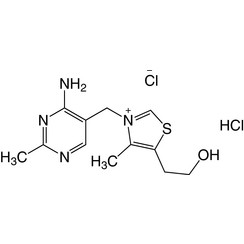You have no items in your shopping cart
Thiamine
Thiamine, also known as thiamin or vitamin B1, is a vitamin found in food, and manufactured as a dietary supplement and medication. Food sources of thiamine include whole grains, legumes, and some meats and fish. Grain processing removes much of the thiamine content, so in many countries cereals and flours are enriched with thiamine. Supplements and medications are available to treat and prevent thiamine deficiency and disorders that result from it, including beriberi and Wernicke encephalopathy. Other uses include the treatment of maple syrup urine disease and Leigh syndrome. They are typically taken by mouth, but may also be given by intravenous or intramuscular injection.
Thiamine supplements are generally well tolerated. Allergic reactions, including anaphylaxis, may occur when repeated doses are given by injection. Thiamine is in the B complex family. It is an essential micronutrient, which cannot be made in the body. Thiamine is required for metabolism including that of glucose, amino acids, and lipids.
Thiamine was discovered in 1897, was the first vitamin to be isolated in 1926, and was first made in 1936. It is on the World Health Organization's List of Essential Medicines, the safest and most effective medicines needed in a health system. Thiamine is available as a generic medication, and as an over-the-counter drug.

